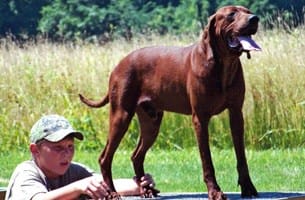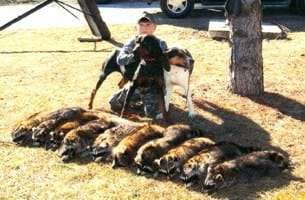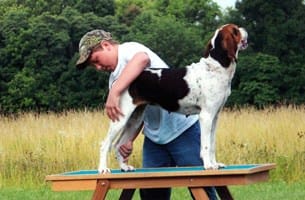
At just 12, Dakota Chumley of Mulberry Grove knows a thing or two about blood lines.
It’s not only the fact that when you’re a championship coon hunter you need a well-bred dog.
It’s also about loving the sport. For Dakota Chumley, the love of coon hunting is a family affair.
“I’ve been hunting since I was three years old, Dakota Chumley said. “My dad is a coon hunter and that’s how I got started with the dogs.”
His father, Marty Chumley, is quick to agree that it’s been a great way to spend time together. “We both end up having a lot of fun competing,” he said.
Dakota Chumley has begun competing in coon hunts with a lot of success. He’s already been named one of the top three youth hunters in the state. This distinction qualifies him to compete in the American Coon Hunters Association World Championship Hunt.
In 2009, he finished second place overall at the State Youth Hunt sponsored by the United Kennel Club in Manchester. He placed second in the UKC Youth Cast Championship in Wooster, Ohio. He took first place finishes at the American Coon Hunters Association youth hunt in Fillmore as well as the ACHA Best of Show. He was named the Grand Champion at Walker Days in Sesser and finished second at the PKC World Youth Hunt Championship in Salem.
“We’re really proud of him and all that he’s accomplished,” his mother, Paula Chumley, said. “It’s been great to watch him do so well with it.”
Coon hunting is a sport that relies on the use of hunting dogs to track and tree raccoons. Hunters can spend thousands of dollars to get a hound dog with the best blood lines – often choosing black and tans, blue ticks or Walkers. The Chumleys choose to use only Trackman blood lines for their hunting dogs.

Strictly Business, or Biz, has been the dog standing beside Dakota Chumley at all of his recent wins. At three years old, Biz is still young. He sits in the middle of a long line of dogs that the Chumleys have either bought or bred in the last few years. “Angel, Star, Old Hank, Biz, Griz, Ruby and Rebel, I think,” Dakota Chumley said, when asked to name all of the hunting dogs he’s had.
“It’s all about knowing your dog and knowing the voice of your dog,” Dakota Chumley said. “That’s one way to keep from getting disqualified or thrown out of the competition.”
The raccoons are not killed in the field trial competitions. “Raccoons must be taken during its season that runs from November to February,” Paula Chumley said.
His godparents, Dwayne and Vickie Beaver, gave him the first dog of his own, Star. “We credit them for having gotten him started with all of this,” Paula Chumley said. “That’s when he decided he wanted to start competing.”
Both of his parents agree it’s a great way for him to spend his time. “Even though it can be an expensive sport, it’s worth it if he keeps it up,” Paula Chumley said. “If he’s having fun, then that’s what it’s all about.”
Entry fees, equipment and travel can add up quickly like with other sports. “They’ve started offering scholarships to college for some of the winners, so that’s something that we’re hoping can maybe come out of this too,” Marty Chumley said.
Setting up for a big hunt takes a little bit of time, according to Dakota Chumley.
Since raccoons are a nocturnal creature, the sun has to be down before the hunt can begin.

“We start out by having to get everything you need together,” he said. “We use a GPS (global positioning system) that hooks up to the dog’s collars. You can tell everything by it – like how far your dog is running and just where they’re at,” he said. “The other stuff you need is a stopwatch, a hat with a spotlight, all of the clothes you need to wear to hunt, and a coon squaller to make the coon look at you.”
Once they’ve collected all of their gear, they head to the club and sign up for the event. “We then have to draw out casts because we’re partnered up with other kids to go out on the actual hunt,” he said. “There are four dogs in a cast.”
A system of pluses and minuses are used by the judges. Scores are based off of how many coons are treed, and how the dog behaves as it performs its job.
The hunts don’t begin until after the sun goes down. Raccoons, a nocturnal creature, do not come out of their dens until night.
Sometimes the hunts can go till 2 or 3 a.m., even with a time limit of one to two hours. “It just kind of depends on what happens,” Dakota Chumley said. “Most of the time we’re done by midnight.”
Now that coon hunting has gotten in his blood, Dakota Chumley says it will stay there all of his life. “I love it,” he said. “I love to win and I love to be outdoors. It’s a lot of fun. I really like working with the dogs, too.”
His next competition is scheduled for the end of March. The Chumleys travel to five different states to participate in coon hunts including Oklahoma, Kentucky, Ohio, Mississippi and northern Missouri.







